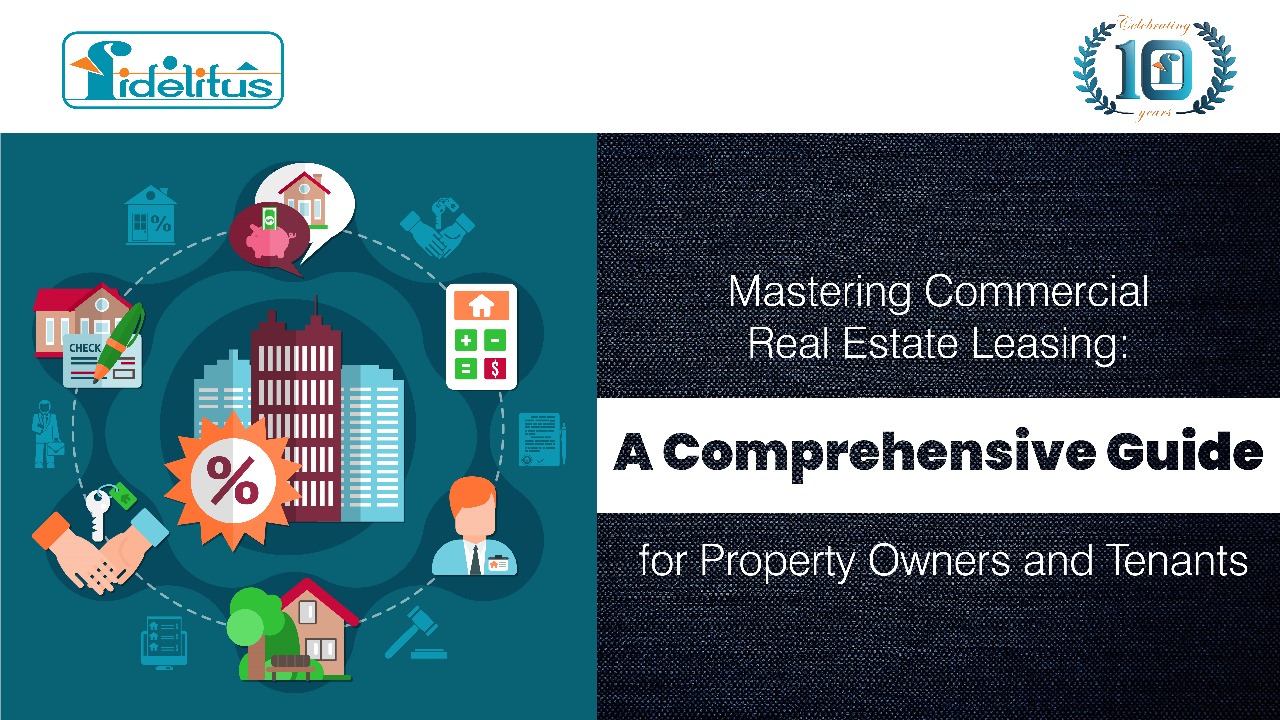Introduction:
Commercial real estate leasing is a complex process that requires a deep understanding of various aspects. Whether you are a property owner seeking tenants or a prospective tenant in search of the perfect space, having a solid grasp of leasing agreements, negotiation strategies, market evaluation, lease renewal tactics, and due diligence is crucial for success. In this comprehensive guide, we will delve into each facet of commercial real estate leasing, equipping you with the knowledge and insights needed to make informed decisions and maximize the value of your commercial property investments.
- Working with a Trusted Commercial Property Services Provider Partnering with a reputable commercial property services provider like Fidelitus Corp offers numerous advantages throughout the leasing process. Let’s explore the key benefits:
- Expertise and Industry Knowledge: Fidelitus Corp brings decades of experience in the commercial property services industry. Their team of professionals possesses in-depth knowledge of market trends, legal requirements, and industry best practices. With their guidance, clients receive expert advice and guidance throughout the leasing process.
- Access to a Broad Network: Fidelitus Corp has a vast network of property owners, tenants, and industry contacts. This network provides valuable opportunities for connecting property owners with potential tenants and helps tenants find the ideal commercial space that meets their requirements.
- Streamlined Processes: Fidelitus Corp streamlines the leasing process by handling essential tasks such as lease document preparation, property marketing, tenant screening, and lease administration. Their efficient processes save time and reduce administrative burden for clients.
- Mitigating Risks: With Fidelitus Corp’s assistance, clients can navigate potential risks and pitfalls associated with leasing transactions. Their due diligence practices, comprehensive property inspections, and adherence to legal and regulatory requirements ensure a secure and compliant leasing process.
- Personalized Solutions: Fidelitus Corp understands that every client’s leasing needs are unique. They offer personalized solutions tailored to each client’s specific requirements, goals, and budget. Their collaborative approach ensures that clients receive customized strategies and recommendations.
2. Understanding the Client’s Requirements A crucial step in the leasing process is understanding the client’s specific requirements. Fidelitus Corp takes the time to listen and understand the client’s needs to shortlist properties that align with their preferences. Factors such as cost, convenience, amenities, and suitability are thoroughly evaluated, providing clients with multiple options to review before making a decision.
3. Evaluating Market Rates Accurate market rate evaluation is essential for fair lease agreements. To help you make informed decisions, consider the following:
-
- Market Research: Gather and analyze market data, including comparable property rents, vacancy rates, and recent transactions. This research will enable you to determine competitive rental rates and make appropriate pricing decisions.
- Factors Influencing Commercial Property Values: Location, market trends, proximity to amenities, building condition, and infrastructure play a significant role in assessing property value. Understanding these factors will help you accurately evaluate market rates.
- Using Market Data to Negotiate: Leverage your market research findings during negotiation to strengthen your position and secure fair lease terms.
4. Negotiating Favorable Terms Successful lease negotiations require careful planning and effective communication. Consider the following strategies:
-
-
- Pre-Negotiation Preparation: Define your needs, conduct market research, and set negotiation goals before entering discussions. This preparation will enable you to present your requirements effectively and negotiate from a position of strength.
- Effective Negotiation Techniques: Explore various negotiation strategies, such as anchoring, concessions, trade-offs, and win-win solutions. Employing these techniques can lead to mutually beneficial outcomes.
- Lease Concessions and Financial Considerations: Understand common lease concessions and financial factors involved, such as rental rates, security deposits, and lease warranties. Carefully consider these aspects to ensure a favorable lease agreement.
-
5. The Importance of Due Diligence Conducting thorough due diligence is vital to identify potential risks and obligations associated with the lease. Consider the following:
-
-
-
- Property Inspections and Assessments: Comprehensive property inspections help identify any physical defects, code violations, or maintenance issues that may impact tenant occupancy. Assess the property’s location, transportation accessibility, compliance with construction by-laws, and overall suitability.
- Compliance with Regulations: Verify compliance with building codes, zoning regulations, ADA accessibility requirements, and environmental standards. Non-compliance can pose risks and affect the viability of the lease.
- Financial Stability and Reputation: Research the financial stability and reputation of the landlord or tenant to ensure a stable and trustworthy leasing relationship.
-
-
6. Understanding Lease Agreements Lease agreements form the foundation of any commercial real estate lease. Pay attention to the following key aspects:
-
- Tenure of the Lease: Capture the intended duration of the tenant’s occupancy in the lease agreement.
- Rentals Agreed: Clearly outline the agreed-upon rental rates and any associated escalations.
- Security Deposit: Specify the interest-free refundable security deposit to be paid by the tenant, including conditions for refund and deductions.
- Lock-in Period: Include a clause that binds both parties to their responsibilities for a specific period, often with more significance for the tenant.
- Notice Period: Define the agreed-upon timeframe for vacating and returning the premises.
- Other Clauses: Address additional clauses covering force majeure events, severability, waiver, attornment, dispute resolution, and other pertinent details.
Clear and concise language in lease agreements is vital to prevent misunderstandings and potential disputes.
7. Lease Renewal Strategies Lease renewal provides an opportunity to reassess lease terms and adapt to changing needs. Consider the following strategies:
-
- Timely Renewal Discussions: Initiate lease renewal discussions well in advance of the lease expiration date to allow ample time for negotiation and planning.
- Assessing Market Conditions: Evaluate market conditions, rental trends, and demand-supply dynamics to gauge the feasibility of lease renegotiation.
- Enhancing Property Appeal: Identify potential property upgrades, modifications, or tenant amenities that can improve leasing prospects during the renewal process.

Mastering commercial real estate leasing requires a comprehensive understanding of the process’s various aspects. By working with a trusted commercial property services provider like Fidelitus Corp, property owners and tenants can benefit from expertise, insights, and support to navigate the complexities of leasing transactions. From understanding client requirements to evaluating market rates, negotiating favorable terms, conducting due diligence, and crafting comprehensive lease agreements, Fidelitus Corp offers a holistic approach to commercial real
estate leasing. By leveraging their guidance and knowledge, clients can make well-informed decisions, negotiate favorable lease terms, and ensure compliance with regulations. With Fidelitus Corp as your trusted partner, you can confidently navigate the leasing process and unlock the full potential of your commercial real estate investments.
- Working with a Trusted Commercial Property Services Provider Partnering with a reputable commercial property services provider like Fidelitus Corp offers numerous advantages throughout the leasing process. Let’s explore the key benefits:
- Expertise and Industry Knowledge: Fidelitus Corp brings decades of experience in the commercial property services industry. Their team of professionals possesses in-depth knowledge of market trends, legal requirements, and industry best practices. With their guidance, clients receive expert advice and guidance throughout the leasing process.
- Access to a Broad Network: Fidelitus Corp has a vast network of property owners, tenants, and industry contacts. This network provides valuable opportunities for connecting property owners with potential tenants and helps tenants find the ideal commercial space that meets their requirements.
- Streamlined Processes: Fidelitus Corp streamlines the leasing process by handling essential tasks such as lease document preparation, property marketing, tenant screening, and lease administration. Their efficient processes save time and reduce administrative burden for clients.
- Mitigating Risks: With Fidelitus Corp’s assistance, clients can navigate potential risks and pitfalls associated with leasing transactions. Their due diligence practices, comprehensive property inspections, and adherence to legal and regulatory requirements ensure a secure and compliant leasing process.
- Personalized Solutions: Fidelitus Corp understands that every client’s leasing needs are unique. They offer personalized solutions tailored to each client’s specific requirements, goals, and budget. Their collaborative approach ensures that clients receive customized strategies and recommendations.
2. Understanding the Client’s Requirements A crucial step in the leasing process is understanding the client’s specific requirements. Fidelitus Corp takes the time to listen and understand the client’s needs to shortlist properties that align with their preferences. Factors such as cost, convenience, amenities, and suitability are thoroughly evaluated, providing clients with multiple options to review before making a decision.
3. Evaluating Market Rates Accurate market rate evaluation is essential for fair lease agreements. To help you make informed decisions, consider the following:
-
- Market Research: Gather and analyze market data, including comparable property rents, vacancy rates, and recent transactions. This research will enable you to determine competitive rental rates and make appropriate pricing decisions.
- Factors Influencing Commercial Property Values: Location, market trends, proximity to amenities, building condition, and infrastructure play a significant role in assessing property value. Understanding these factors will help you accurately evaluate market rates.
- Using Market Data to Negotiate: Leverage your market research findings during negotiation to strengthen your position and secure fair lease terms.
4. Negotiating Favorable Terms Successful lease negotiations require careful planning and effective communication. Consider the following strategies:
-
-
- Pre-Negotiation Preparation: Define your needs, conduct market research, and set negotiation goals before entering discussions. This preparation will enable you to present your requirements effectively and negotiate from a position of strength.
- Effective Negotiation Techniques: Explore various negotiation strategies, such as anchoring, concessions, trade-offs, and win-win solutions. Employing these techniques can lead to mutually beneficial outcomes.
- Lease Concessions and Financial Considerations: Understand common lease concessions and financial factors involved, such as rental rates, security deposits, and lease warranties. Carefully consider these aspects to ensure a favorable lease agreement.
-
5. The Importance of Due Diligence Conducting thorough due diligence is vital to identify potential risks and obligations associated with the lease. Consider the following:
-
-
-
- Property Inspections and Assessments: Comprehensive property inspections help identify any physical defects, code violations, or maintenance issues that may impact tenant occupancy. Assess the property’s location, transportation accessibility, compliance with construction by-laws, and overall suitability.
- Compliance with Regulations: Verify compliance with building codes, zoning regulations, ADA accessibility requirements, and environmental standards. Non-compliance can pose risks and affect the viability of the lease.
- Financial Stability and Reputation: Research the financial stability and reputation of the landlord or tenant to ensure a stable and trustworthy leasing relationship.
-
-
6. Understanding Lease Agreements Lease agreements form the foundation of any commercial real estate lease. Pay attention to the following key aspects:
-
- Tenure of the Lease: Capture the intended duration of the tenant’s occupancy in the lease agreement.
- Rentals Agreed: Clearly outline the agreed-upon rental rates and any associated escalations.
- Security Deposit: Specify the interest-free refundable security deposit to be paid by the tenant, including conditions for refund and deductions.
- Lock-in Period: Include a clause that binds both parties to their responsibilities for a specific period, often with more significance for the tenant.
- Notice Period: Define the agreed-upon timeframe for vacating and returning the premises.
- Other Clauses: Address additional clauses covering force majeure events, severability, waiver, attornment, dispute resolution, and other pertinent details.
Clear and concise language in lease agreements is vital to prevent misunderstandings and potential disputes.
7. Lease Renewal Strategies Lease renewal provides an opportunity to reassess lease terms and adapt to changing needs. Consider the following strategies:
-
- Timely Renewal Discussions: Initiate lease renewal discussions well in advance of the lease expiration date to allow ample time for negotiation and planning.
- Assessing Market Conditions: Evaluate market conditions, rental trends, and demand-supply dynamics to gauge the feasibility of lease renegotiation.
- Enhancing Property Appeal: Identify potential property upgrades, modifications, or tenant amenities that can improve leasing prospects during the renewal process.
Disclaimer: This article is for informational purposes only and does not constitute legal advice. It is advisable to consult with qualified professionals for specific guidance on commercial real estate leasing matters.










